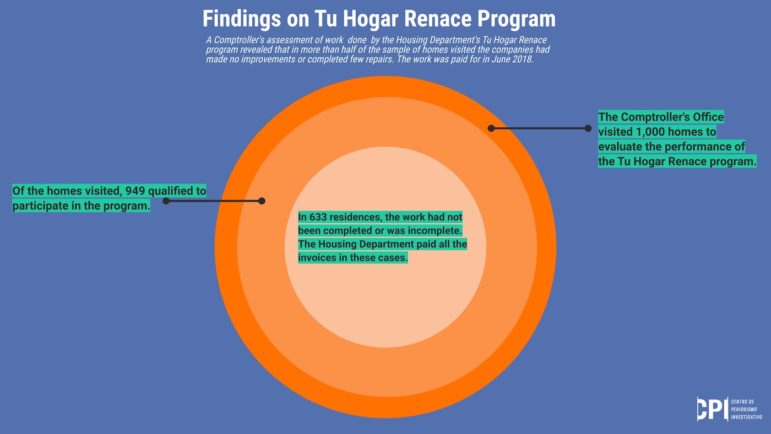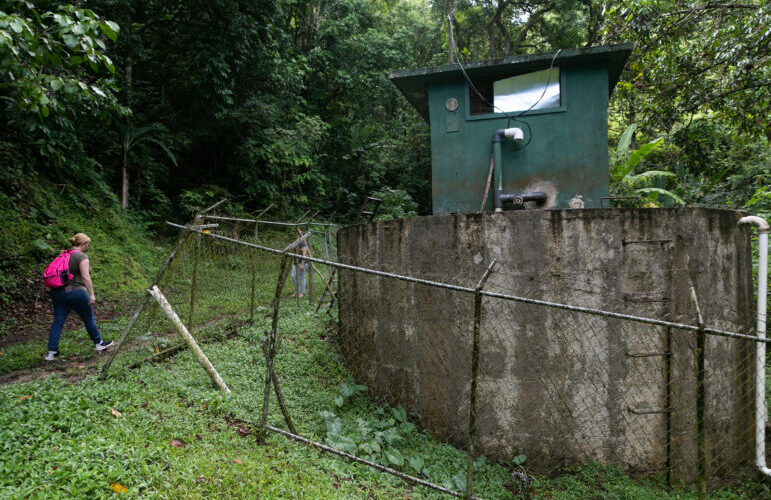Photo by Dennis A. Jones | Metro PR
Puerto Rico’s Comptroller, Yesmín Valdivieso
The Department of Housing (DH) paid more than $5 million for projects that were not done or were deficient under the Tu Hogar Renace housing reconstruction program, according to an evaluation by the Puerto Rico’s Office of the Comptroller (OCPR, in Spanish), conducted in 2018, but kept under wraps until now.
The DH paid $5,817,382 for 633 work orders where at least one of the jobs was not done or was insufficient , as part of the program established after Hurricane María in 2017.
The OCPR flagged the payment as contrary to the “policy that the Department established, that an unfinished case could not be processed for payment.” In addition, the Comptroller’s Office stated that the jobs that were not performed or that were carried out poorly were “certified as done by the Oversight Manager, the Program Manager, and ‘pre-intervened’ by the Department.” The DH did not react to the findings of this story.
The firm Hage & Integra appeared as Oversight Manager of Tu Hogar Renace, while Adjusters International was the Program Manager. Adjusters is a subsidiary of Rising Phoenix Holdings Corp., whose more than $207 million contract has been one of the largest granted with recovery funds in Puerto Rico. The DH canceled Adjusters’ contract on allegations that it had no financial capacity, but the Court of Appeals issued a ruling that the contracting prevailed.
The evaluation also revealed that the people who received services under Tu Hogar Renace had no prior knowledge of the repairs that would be done to their homes, which kept them from confirming if the tasks carried out were those to which they were entitled.
Although the Center for Investigative Journalism (CPI, in Spanish) had requested this report from the OCPR since 2019, it was delivered two years later, now that Comptroller Yesmín Valdivieso is on her way out of the OCPR after her term is up. In 2019, Valdivieso told the CPI that the results of the report were used as a guide to identify and review citizen complaints against the program, but that there was no final document to provide and that she did not give it to anyone.
The secrecy of this document was also one of the reasons for requesting a Special Independent Prosecutor (FEI, in Spanish) for Valdivieso, a case that began with an anonymous complaint submitted by a group called Auditores Unidos. But the Panel accepted a determination by the then Justice Secretary Dennise Longo Quiñones to not appoint one.
When delivering the report to the CPI, Lisandra Rivera, director of the OCPR’s Press and Communications Office, stressed that it was not a formal audit but that the results were discussed with the person in charge of Housing at that time, Fernando Gil Enseñat. Rivera said the Comptroller also discussed the document with then-Governor Ricardo Rosselló at a meeting of the Anticorruption Group.
However, the document provided to the CPI says it is a draft that was delivered to Luis Carlos Fernández Trinchet on February 24, 2020. Fernández Trinchet became head of Housing in January 2020, after Gov. Wanda Vázquez Garced asked Gil Enseñat to resign.
To carry out the evaluation, the OCPR visited 1,000 houses that were selected using the statistical methodology of stratified sampling, after the DH provided the data of 5,411 cases in which services had been paid for to the contractors as of June 30, 2018. Of those 1,000 households, only 949 qualified for the program. And of those, the DH paid for “all the jobs included in the orders, even when there were jobs not done or deficient” in 633 houses.
The seven firms contracted for the program, 4 Contractors JV, Caribe Tecno, CRL, Excel Contractors, Inc., FR-BLDM JV, James W. Turner Construction, Ltd., SLS Co. LTD and Yates Bird LLC/JV, did not finish some jobs, or did them poorly. However, the three companies with the most unfinished work were SLS Co. LTD, James W. Turner Construction, Ltd., and FR-BLDM JV.
SLS and FR-BLDM are on the list of those with the most recovery contracts in Puerto Rico. Each received $250 million to carry out work for the Tu Hogar Renace program. Both companies have a contract with Housing valid until 2022 for $50 million each, as construction managers under the Repair, Reconstruction and Relocation (R3) program.
SLS, as well as Yates Bird were contracted to build the controversial wall that Donald Trump tried to erect on the southern border of the United States.
For the evaluation, the OCPR grouped the work carried out under the Tu Hogar Renace program into areas such as security, weatherproofing, cleaning, electrical system, structural, sanitary, and kitchen cabinets.
In the area of security, the evaluation found that most of the non-compliance issues were related to the replacement of aluminum windows.
“We found that, in some cases, instead of installing the window, the window operators were installed. We also saw that in others, the finishes were flawed,” says the document.

The OCPR also evaluated 12 complaints from people dissatisfied with the program.
However, the Office noted as “the most significant situation” the case of a Morovis home that underwent repairs totaling $18,557 but which were so deficient that the residents had to move out of the house.
“In a letter to the Secretary of Housing on July 20, 2018, the owner of the house said she was not satisfied with the work carried out. They put the roof on top of old and deteriorated wood. In addition, they changed the floor tiles for pieces of wood not resistant to the weight of their sick son, who is bedridden. She also said the Program staff have not visited her again and the dwelling is unfit to live in it. This prompted her and her son to move to a relative’s house,” the document says.
According to the evaluation, the OCPR visited the residence on September 4, 2018. At the time, the owner said that first she was told that she was ineligible, but then they came back and said yes, “because a person with disabilities lived in the residence.”
During the visit, they saw that the projects were not completed according to the initial inspection and change orders. Among the tasks that were incomplete were that the windows were not replaced, they did not install all the kitchen cabinets described in the order, and those that were installed do not look new, and that the wood on which the new roof was placed looked deteriorated and unstable to support it. In addition, there were exposed nails, screws, and electrical wires.
The OCPR also conducted a survey in the 970 households visited, and regarding the time that it took from when they filled out the application to the initial visit, 65% of the participants responded that it took between one and 30 days, 27% from 31 to 61 days, and 8% said it took 61 days or more.
Although 96% of the residents said in the survey that they were informed about the tasks that would be carried out in their homes, during the interview, they responded that they did not know what jobs would be carried out, since they did not receive a worksheet in which they were broken down in detail, according to the document.
Sixty-seven percent of those surveyed said that Tu Hogar Renace met their needs and 33% said it did not.
In addition, 94% said that government contractors showed professional conduct while 6% said they did not.
The OCPR made direct recommendations to the Secretary of Housing, including “remembering that he is solely responsible before the federal government for the proper use of the allocated funds.”
In addition, the agency asked him to require the Program Manager to recommend for payment only those cases where the work had been done and inspected, and to compel the Department’s Internal Audit Office to carry out periodic audits of the contracted work, and of the operations related to the Oversight Manager (Hage & Integra) and the Program Manager (Adjusters International).
The OCPR also recommended that the DH re-evaluate Tu Hogar Renace applications that were not accepted due to the extent of the damage and refer them to the Permanent Improvements Program under CDBG-DR funds. Similarly, it suggested referring to the same program those repair requests for homes which, although approved, were in conditions that needed substantial improvements.
Omar Marrero, former director of the Central Office of Recovery, Reconstruction and Resiliency (COR3), had told the CPI that the people who benefited from Tu Hogar Renace would have priority in the Housing Reconstruction, Repair and Relocation program (R3) that began on June 30, 2019. This program, however, has been slow. Of the more than 20,000 applications it received, as of February 2021 there were only 613 houses completed and 1,277 in the process of construction, design or permits.
Another recommendation from the Comptroller was that, for future projects like these, the DH should establish a mechanism to guide and inform participants in writing about the work to be carried out in their homes, so that they can make sure that contractors follow through with what is required.
When asked by the CPI as to whether the OCPR followed up on if the DH followed the recommendations, the OCPR’s Director of Communications said, “we had not audited the DH since then, and this was not an audit.”
As to why a formal audit of the program was not done, given that the OCPR invested resources, time and public funds in the more than 200 auditors who participated in the audit, Rivera said although it was not an audit, the Comptroller “decided that the OCPR should know first-hand if all the complaints that were reported in the media were true and we had to do it as soon as possible to be able to see first-hand what was happening.”
However, she said that because they were federal funds, federal authorities are mainly responsible for auditing. “We were also able to provide all the information to OIG [Office of Inspector General] and HUD [US Department of Housing] auditors when they were in Puerto Rico,” she added.

8 septiembre, 2022 LEER MAS